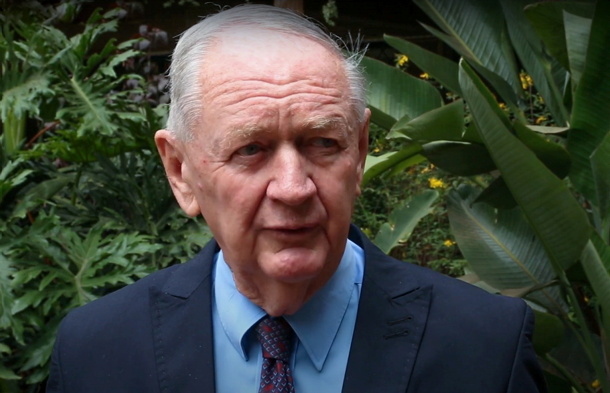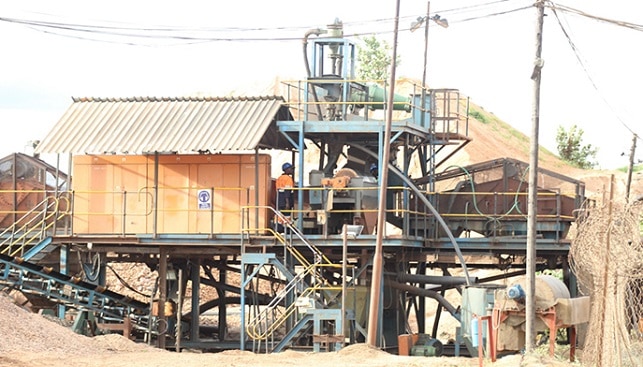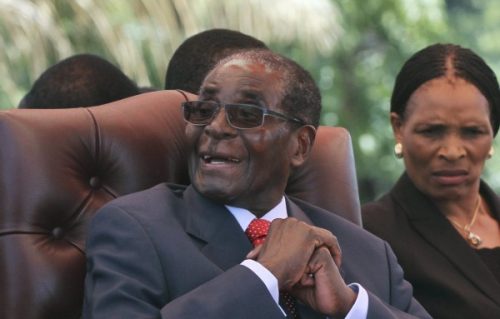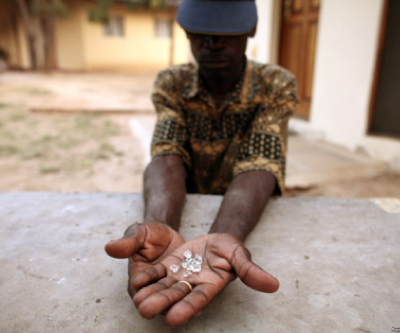The list of hardships and suffering linked to Zimbabwe’s diamond mines is growing longer by the day.
Since diamonds were discovered in the Marange fields in 2001, non-governmental organisations have been looking into abuse and dodgy dealings:
Human rights violations;
Opaque business deals;
Unfair treatment of residents;
Diamond smuggling.
The Marange diamond fields are in Chiadzwa, Mutare District, in eastern Zimbabwe. Thousands of people have been displaced to make way for mining operations.
Chinese mining companies and the Harare government made big promises to the displaced people, and their hopes are fading, with people saying they were duped to move out of their ancestral lands.
When Zimbabwean villagers from Chiadzwa were relocated to Agricultural Rural Development Authority (Arda) Transau, a state-owned farm in Odzi, about 40km from Mutare, to pave way for diamond mining, they were promised better life by both the government and several Chinese mining companies.
The government relocated more than 1 200 villagers from Chiadzwa to Arda Transau in 2009 after forcibly removing, in a bloody crackdown, more than 20 000 small-scale miners who had invaded the once-rich diamond fields in 2006.
Promises, promises
Arable lands, a US$5 000 compensation fee, grazing lands, schools and jobs are some of what the relocated residents were promised.
Chinese mining companies that were among the seven companies given mining rights include Jinan and Anjin — a company jointly owned by Chinese company Anhui Foreign Economic Construction Company Limited and Matt Bronze, a company owned by the Zimbabwe Defence Forces.
When the government under Zimbabwe’s long-time ruler, the late Robert Mugabe, took over the diamond fields through the newly formed Zimbabwe Consolidated Diamond Company (ZCDC) in 2016, some of the relocated villagers were hopeful that the move would improve their livelihoods.
Anjin was against Mugabe’s move and took his government to court.
In 2019, Anjin joined mining companies ZCDC in Chiadzwa after it was given back its mining license following pressure from Beijing on President Emmerson Mnangagwa, who came to power after Mugabe was toppled through a military coup in November 2017.
Hopes fading away
Many relocated residents say they got an unfair deal. They are living in dilapidated houses while their children are learning in makeshift classes. This is no clean water and few jobs.
“When I relocated to this area in 2010, this house was already cracking,” Jason Musiyanga (40), a father of three, said.
Musiyanga, whose name has been changed to protect his identity for fear of reprisal, says no one is coming to his rescue.
“I am living in fear. One day, this four-roomed house might just fall while I am asleep with my family,” he said.
Not enough to go around
Nomore Mamombe 51 said his one-hectare piece of land was not enough to accommodate his family of seven children with four of them married.
“Back in Chiadzwa, I had a 16-hectare piece of land which was enough for my children to build their own houses when they get married. Now we are sharing this four-roomed house,” Mamombe said.
“It is against my Shona culture for me to share the same house with my daughters-in-law.”
Looking for answers
Neither the government nor the companies are claiming responsibility for the hardships of the residents of Arda Transau.
Each group of villagers was relocated by each of the seven companies that had been granted mining licenses by the government.
Musiyanga was relocated by Anjin, while Mamombe was relocated by Jinan.
Mines minister Winston Chitando did not respond to questions sent to him by The Africa Report.
Anjin secretary Richard Mahoya, in a telephone interview, requested the questions to be sent to him via email.
They were sent, and he acknowledged receipt, but he had not yet responded by the time of publishing.
No property security
“The Chinese built nearly 1 000 houses for over 1 200 households,” according to the Arda Transau Relocation Development Trust (ATRDT).
Tawanda Mufute, the ATRDT secretary, said they did not have title deeds to their properties.
“We have made strides for us to get title deeds but our efforts were fruitless. There are fears that if another mineral like gold is found where we are now, we might be relocated again. We do not have any property security,” he said.
Mufute added that the population had since grown and villagers were now competing for the few available resources.
“Our population is now more than 9 000,” he said.
A single school
The relocated villagers are sharing one school which was constructed by Anjin.
“Our primary school has a population of more than 1 200 pupils. This is against four blocks that were built by Anjin. Parents have also built another block, but they are inadequate. Some pupils are learning in makeshifts classes,” Mufute said.
He added that the relocated villagers were yet to be compensated by the Chinese companies.
“In terms of compensation, the families are yet to receive the US$5 000 compensation fee which they were promised. They were only given US$1 000 as a disturbance allowance when they were relocated,” Mufute said.
No clear lines of responsibility
Mufute said it was not clearly outlined who should be responsible for these relocated Chiadzwa villagers between the government and Anjin.
“It is all about blame games. The government is saying it is the Chinese companies yet the Chinese companies are saying they are waiting to hear from the government,” said Mufute.
‘Pleasing investors at the expense of the indigenous people’
Simiso Mlevu, spokesperson for Centre for Natural Resource Governance, said it was the responsibility of government to take care of the socio-economic needs of the people.
“The predicament of the people of Arda Transau simply shows that the government does not have people-centric policies,” she said.
“Our policies are aimed at pleasing the investors at the expense of indigenous people. Indigenous communities need to enjoy economic, cultural and social security in their own country.”
Shamiso Mtisi, the Zimbabwe Environmental Law Association’s deputy director, said it was important for government to comply with constitutional provisions related to evictions of communities.
“Government and companies must provide people with adequate information on displacement implementation plans including associated costs, compensation levels, where people will go, what they will get including time frames,” he explains.
Source: The Africa Report







